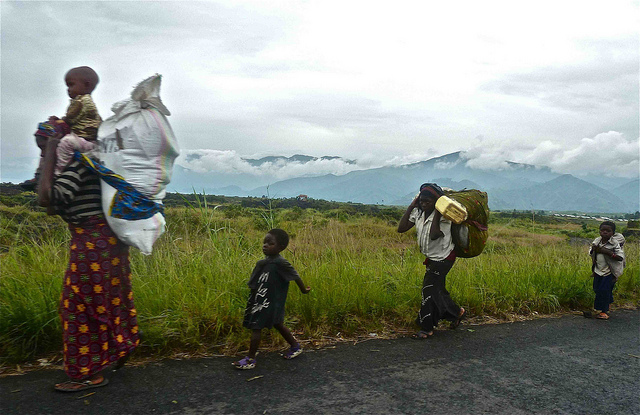
Over the past week, the M23 rebels have made major advances on strategic border towns in the North Kivu province of the Democratic Republic of the Congo. Since their rebellion from the Congolese army over three months ago, the M23 movement has grown considerably in manpower and occupied territory. Although representatives of the M23 have stated that they do not intend on gaining any more territory, their actions have shown otherwise.
According to Congolese civil society leaders, Jomba was the first town to fall under M23 control after being attacked early Thursday morning. Jomba is strategically important because it is the only major town on the road between the Bunagana border post and the large mineral rich town of Rutshuru. Later Thursday night, fighting continued between Congolese forces and the M23 rebels leading to the capture of the Bunagana border post itself. Sources on the ground reported that Rwandan forces were also present during the fighting, allegedly taking the side of the M23. The intense shootout resulted in the death of at least one U.N. soldier.
As of late Friday night and into the weekend, civil society members, aid agency staff, and local inhabitants reported that the M23 rebels had seized control of three more towns: Rutshuru, Ntamugenga, and Rubare. Reports stated that eight peacekeepers from the U.N.'s mission in Congo, or MONUSCO, fled Rutshuru for a nearby U.N. base in Kiwanja. The rebels claimed that some areas were easily captured because they did not face any opposition from the Congolese army, or FARDC. Like Jomba and Bunagana, these seizures are significant because they will allow the M23 rebels to levy import taxes and ship commodities out of the Congo and into neighboring countries. All three of these towns lie on the road leading to the provincial capital of Goma which would be a substantial blow to the Congolese government if captured.
Prior to Thursday’s attacks, the M23 movement told Reuters that they had no intention of taking Rutshuru or Goma. They stated, "Our aim is not to go to even Rutshuru, not even Goma … We want to remain here and call the government to come here and we negotiate," stated M23 political commissar Colonel Vianney Kazarama. However, despite the M23’s call for negotiations, they maintain control over the already seized territories and have positioned their forces in apparent preparation for further advancements.
Reacting to the recent escalation, Enough Project Senior Policy Analyst Sasha Lezhnev said:
Eastern Congo's towns and army forces are falling like chess pieces to the Rwandan-backed M23 rebels, yet the international community is lingering in wait-and-see mode. The fall of the major trading towns Rutshuru and Bunagana give the M23 strategic bases in its new war, allowing it to control a lucrative smuggling route to sell conflict minerals and illegally tax goods. The U.N. must deploy significant forces to protect fleeing civilians in the area, and President Obama should directly call Rwandan President Paul Kagame to stop all support to the M23.
Enough Project Executive Director John Bradshaw echoed concerns about the severity of the situation and called for attention from the Obama administration. “The fall of Rutshuru signals a major threat to the region, and the city of Goma, where over 500,000 people live, may be next,” Bradshaw said. “The M23's aggressive actions sharply contradict its public statements, and the Obama administration must pay attention to these when examining all aid policy to Rwanda."
As the intensity of the situation in eastern Congo continues to escalate, so does the risk posed more broadly to the stability of the central African region. It is imperative that all international bodies cooperate in order to minimize the spread of the violence and bring this latest crisis to peaceful resolution.
Photo: Women and children flee violence in Masisi (Enough / Sarah Zingg Wimmer)

